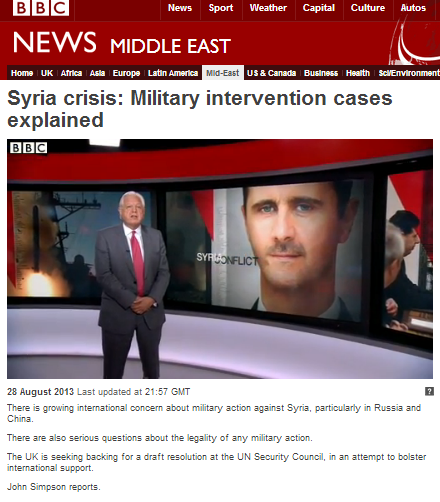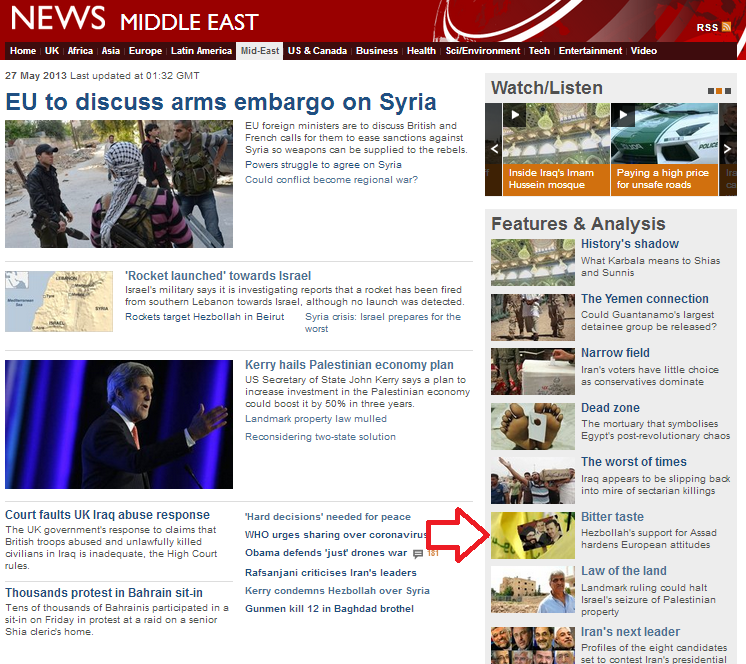A filmed report from August 28th titled “Syria crisis: Military intervention cases explained” which appeared on BBC television news, as well as among the extensive Syria coverage on the BBC News website’s Middle East page, purports – according to its title – to clarify the opposing arguments for audiences. The BBC has even brought in the big guns in the form of its veteran World Affairs Editor John Simpson to do the job.
But if audiences were anticipating an impartial, accurate and informative presentation of the cases for and against Western military intervention in Syria, they would have been sorely disappointed by Simpson’s ill-disguised attempts to make parallels with the Iraq war, presented in facetious tones and with barely concealed disdain.
At 01:53, following a short interview with William Hague talking about the “responsibility on chemical weapons”, Simpson says:
“But does this responsibility involve lobbing missiles at President Assad’s chemical weapons?”
Modern Western armies of course do not “lob” missiles – that term deliberately implies a casual, imprecise and irresponsible approach. Simpson continues:
“Well from what President Obama says, it sounds like it. We’re starting to hear all those phrases like ‘quick, clean, surgical action’ – just like before.”
Simpson’s attempt to persuade BBC audiences that the Syrian regime’s chemical weapons stockpiles are to be the target of missile strikes is obviously inaccurate and misleading. No such intention has been declared – quite the contrary in fact.
An article published in the New York Times the day before Simpson’s report states:
“A wide range of [US administration] officials characterized the action under consideration as “limited,” perhaps lasting no more than one or two days. The attacks, which are expected to involve scores of Tomahawk cruise missiles launched from American destroyers in the eastern Mediterranean Sea, would not be focused on chemical weapons storage sites, which would risk an environmental and humanitarian catastrophe and could open up the sites to raids by militants, officials said.” [emphasis added]
The LA Times reports:
“With an estimated 50 storage sites, many situated in or near urban centers, any attempt to destroy or degrade the Assad government’s supply of poison gases and nerve agents would require a massive invasion of ground forces that no nation considered part of the emerging “coalition of the willing” would be likely to support.
Even if U.S. and allied intelligence have precisely located some of the stores of sarin, mustard or VX gas, analysts say, the likelihood of a successful airstrike is slim because of Assad’s powerful air defenses and the risk of bombed chemical stores unleashing their deadly gases.
As the United States and other nations weigh the appropriate response to Assad’s suspected use of chemical weapons in an attack last week that killed hundreds of Syrian civilians, Western military strategists have reportedly concluded there is no way to target the weapons of mass destruction with airstrikes.”
And as the Military Times reported on August 27th:
“The Pentagon will probably avoid targeting stockpiles, which could send toxic gases into the air and cause civilian casualties.
“We don’t want to hit actual chemical weapons because of the dangers,” said Jeffrey White, an analyst at the Washington Institute for Near East Policy and a former Defense Intelligence Agency official.”
Regardless of one’s view of the merits – or lack of them – of a limited scope strike on the Syrian regime’s facilities, BBC audiences’ understanding of the issue is obviously not enhanced by invented factors. John Simpson’s misleading promotion of the notion that Western forces intend to target “President Assad’s chemical weapons” clearly lacks supporting evidence and breaches BBC editorial guidelines on accuracy. The reasons behind the employment of that inaccurate claim should also raise questions about this report’s impartiality.





